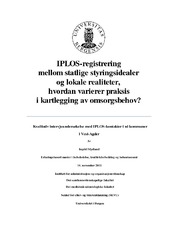| dc.contributor.author | Mydland, Ingrid | en_US |
| dc.date.accessioned | 2019-12-20T14:13:11Z | |
| dc.date.available | 2019-12-20T14:13:11Z | |
| dc.date.issued | 2011-11-10 | |
| dc.identifier.uri | https://hdl.handle.net/1956/21240 | |
| dc.description.abstract | Background: IPLOS (individual-based care and care statistics) are part of health personnel documentation required for care and services to users who seek or receive local care services. National Target by introducing IPLOS regulations in 2006, was similar registration in all municipalities. Purpose:The ambition of the study was to do research on how the IPLOS contacts experience the health personnel’s track of the need for care in IPLOS. By attaining their perception of the paralells and variations in the survey, I hope to achive a better insight in how the standardized surveys and measurements catch up on the knowledge of need of care. Material: A qualitative method is the design chosen as the approach of the problem, which is accomplished as individual interwiews in nine communities in three regions in the county of Vest-Agder. Results:The respondents are categorized into two main groups: consultant and leader. A manager said IPLOS should have been mandatory in elementary education in health sciences, so students know what is required of documentation skills when they come out in public practice. Everyone should have knowledge of IPLOS regardless of whether they work in the state or municipality, not least due the interaction reform coming in 2012. They felt that the tool failed to provide a comprehensive picture of the resource needs of the individual user. Shared by all informants was a view of the tool to a small extent captures rapid demand changes that are so extensive that they will affect the scoring in IPLOS. All informants were consistent in that there is no idyllisering in mapping IPLOS. Managers and consultants believed health professionals struggling to assess the necessary medical care because they wanted to provide more help and care than mapping and resolution allow up to. Several of the informants connected understanding of the scores in IPLOS to professional based path dependency, that in virtue of their education allow different perspectives as the basis for evaluation of user's care needs. One informant used the word "generation" of change in path dependency related to the graduates health workers did not score easily because they were not familiar with the use of data. Leader involvement administrative level in the community was largely absent. The exception was the municipalities that had been made for systematic training in the use of IPLOS as part of project investment in ICT (information and communication technology) in the care sector. Conclusion: Health care has taken hold of the task and according to the respondents in the survey were much better at scoring in IPLOS, but the scores are not equal. Both managers and consultants whose role as IPLOS contact, calls for management support and prioritization of time to interdisciplinary reflection on scoring and training in the use of ICT for local benefit of the tool for management and leadership. | en_US |
| dc.language.iso | nob | eng |
| dc.publisher | The University of Bergen | eng |
| dc.subject | individbasert statistikk | eng |
| dc.subject | instrumentelt perspektiv | eng |
| dc.subject | kulturperspektiv | eng |
| dc.subject | myteperspektiv | eng |
| dc.subject | kvalitativt design | eng |
| dc.title | IPLOS-registrering mellom statlige styringsidealer og lokale realiteter, hvordan varierer praksis i kartlegging av omsorgsbehov? Kvalitativ intervjuundersøkelse med IPLOS-kontakter i ni kommuner i Vest-Agder | en_US |
| dc.type | Master thesis | |
| dc.rights.holder | Copyright the author. All rights reserved | |
| dc.description.degree | Erfaringsbasert master i helseledelse, helseøkonomi og kvalitetsforbedring | |
| dc.description.localcode | HELVID650 | |
| dc.description.localcode | MATF-HEVID | |
| dc.subject.nus | 761901 | eng |
| fs.subjectcode | HELVID650 | |
